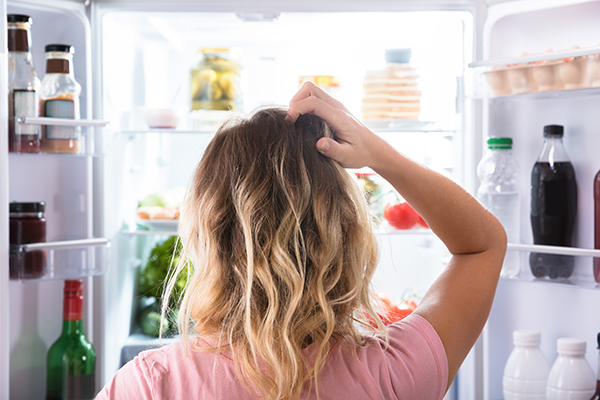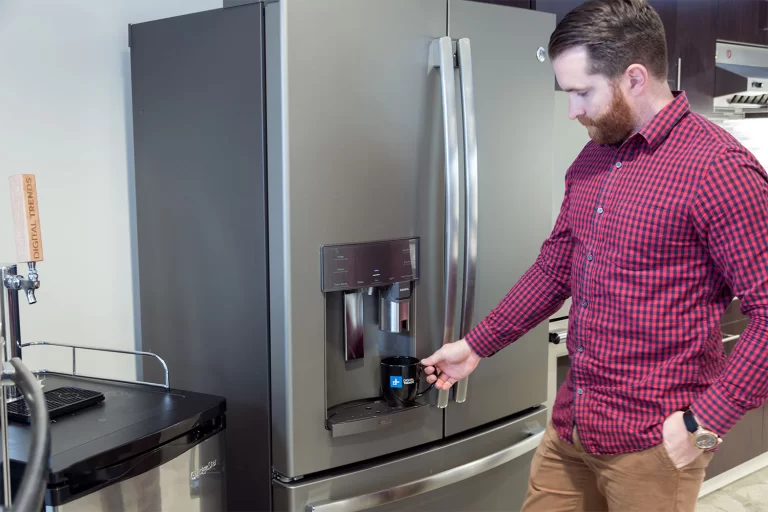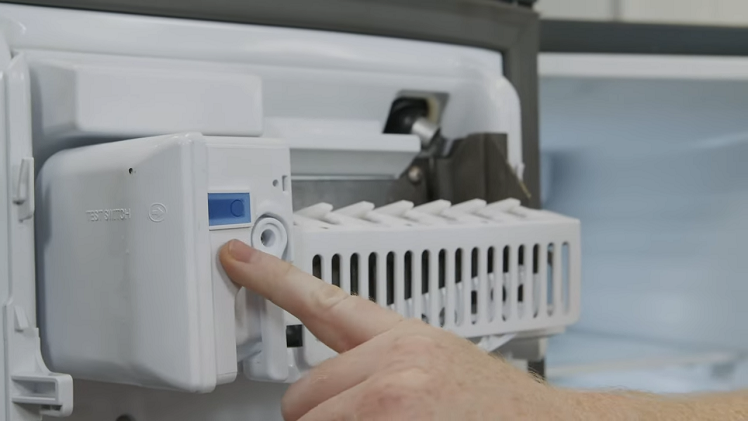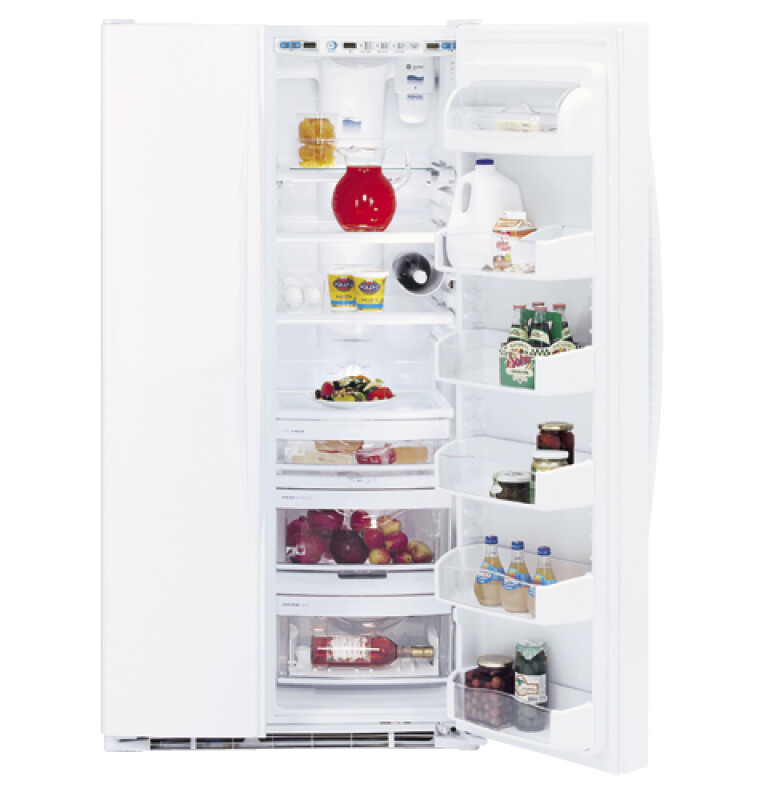Samsung Twin Cooling technology has revolutionized the way refrigerators and freezers operate. With its efficient energy saving, remarkable humidity preservation, impeccable temperature regulation, and odor isolation, it is no surprise that this technology has become a staple in modern households. However, like any technological innovation, it isn’t immune to issues. This guide is here to empower you with the knowledge to troubleshoot common Samsung Twin Cooling fridge freezer problems.
Samsung Twin Cooling fridge freezer problems often include temperature inconsistencies, excessive noise, ice build-up, and water leakage. These issues can stem from faulty fans, sensors, defrost system malfunctions, or blocked drainage tubes
Quick Troubleshoot Guide To Samsung Twin Cooling Fridge Freezer Problems
| Issue | Symptoms | Fix | |
| 1 | Failing Ice Maker | Slow ice production, small or malformed ice cubes | Ensure water supply is connected and has sufficient pressure. Reset ice maker by pressing the reset button. |
| 2 | Twin Cooling Fridge Freezer Not Freezing | Items in the freezer remain unfrozen | Check temperature settings, ensure proper air circulation, clean condenser coils. |
| 3 | Fan Not Working | Fridge not cooling, no air circulation | Check for ice buildup around the fan. If the fan motor is burnt out, replace it. |
| 4 | Excessive Noise | Loud humming or rattling noise | Check if the refrigerator is level, make sure nothing is obstructing the fans, and inspect the compressor. |
| 5 | Water Dispenser Not Working | Water not coming out of the dispenser | Check water supply and ensure it’s connected. Clear any clogs in the water line. |
| 6 | Refrigerator is Too Warm | Items in the refrigerator compartment are not cold | Check the temperature settings, ensure proper air circulation, and check for blockages in the vents. |
| 7 | Ice Buildup | Frost or ice accumulation inside the freezer | Check door seals for leaks, avoid leaving the door open for too long, and defrost if necessary. |
| 8 | Refrigerator Leaking Water | Pools of water under or around the refrigerator | Check the drip pan for cracks, and ensure that the water line and defrost drain are not clogged. |
| 9 | Refrigerator Door Seal Issues | Door not closing properly, condensation around the door | Clean and inspect the door seals for damage. Replace if necessary. |
| 10 | Control Panel or Electronic Issues | Unresponsive or erratic controls, incorrect temperature | Try resetting the refrigerator by unplugging it for 30 seconds. If the issue persists, contact a technician. |
How Twin Cooling Works:

Dual Evaporators and Fans: This system uses separate evaporators and fans for the fridge and freezer, which allows independent temperature control and optimal humidity in each section.
Isolated Airflow: Twin Cooling technology ensures that the dry air in the freezer doesn’t mix with the more humid air in the refrigerator. This is vital in preserving the taste and texture of fresh food and preventing odors from mingling.
10 Samsung Twin Cooling Fridge Freezer Problems with DIY Fixes
1. Samsung Twin Cooling Fridge Not Maintaining Temperature
A common problem that Samsung Twin Cooling fridge owners face is that their fridge is not maintaining the desired temperature. When this issue arises, it’s essential to diagnose the cause to ensure the fridge functions efficiently and keeps food fresh.
Causes
- Incorrect Temperature Settings
Sometimes the problem can be as simple as the temperature settings being changed unintentionally. - Malfunctioning Thermostat
The thermostat is responsible for maintaining the correct temperature inside the fridge. If it’s not functioning properly, the fridge may not be able to hold the desired temperature. - Blocked Vents
Vents inside the fridge allow the cold air to circulate. If these vents are blocked, it might prevent the fridge from cooling effectively.
DIY Solutions
- Tackling Incorrect Temperature Settings:
First, check if the temperature settings are set as per your requirements. In case they have been altered, reset them. Samsung Twin Cooling fridges usually have a digital display, making it easy to check and adjust the temperature settings.
- Dealing with a Malfunctioning Thermostat:
If adjusting the temperature settings doesn’t solve the issue, the thermostat might be the culprit. To test this, set the fridge to the coldest setting and see if the temperature decreases. If not, the thermostat is likely faulty and needs to be replaced.
While it’s possible to replace the thermostat yourself by ordering the part and following online tutorials, it might be wise to contact a Samsung service center to ensure the job is done correctly.
- Clearing Blocked Vents:
Ensure that the vents inside the fridge are not being blocked by food items or containers. Rearrange the items if necessary and ensure there is enough space for air to circulate freely.
2. Samsung Twin Cooling Freezer Overcooling
Another issue that can be faced by users of Samsung Twin Cooling fridge freezers is the freezer compartment cooling to temperatures lower than necessary. This can lead to overly frozen foods and increased energy consumption.
Causes
- Faulty Temperature Sensor
The temperature sensor, or thermistor, measures the temperature inside the freezer. If this part is malfunctioning, it may not be able to accurately gauge and regulate the temperature. - Issue with Control Board
The control board is essentially the brain of the fridge. If it’s not functioning correctly, it could send incorrect signals to the cooling system, causing it to overcool.
Have a bespoke Samsung Fridge: Learn about DIY fixes
DIY Solutions
- Addressing a Faulty Temperature Sensor:
First, check if the temperature settings of the freezer are correct. If the freezer continues to overcool despite proper settings, the temperature sensor might be defective. You can use a multimeter to test the sensor. If it’s not providing the correct readings, it should be replaced. Again, this is a task that can be performed at home if you’re familiar with electronics, but contacting a Samsung service technician is advisable if you’re not confident in doing this.
- Resolving Issues with the Control Board:
If the temperature sensor is functioning correctly, the control board might be the issue. Repairing a control board is not typically a DIY task, as it requires specialized knowledge and tools. In this case, it is best to contact a Samsung service center for assistance.
3. Samsung Twin Cooling Fridge Water Dispenser Not Working

A handy feature of the Samsung Twin Cooling fridge is its water dispenser. However, sometimes the water dispenser might cease to work properly.
Causes
- Frozen Water Line
The water dispenser may not work if the water line supplying it is frozen. - Clogged Filter
A clogged water filter can reduce or stop the water flow to the dispenser.
DIY Solutions
- Fixing Frozen Water Line
To thaw a frozen water line, you can try using a hairdryer. Unplug the fridge, open the doors, and aim the hairdryer at the water line for a few minutes until the ice melts. - Replacing a Clogged Filter
If the filter is clogged, replace it with a new one. This is usually an easy task that involves twisting the old filter out and inserting a new one.
4. Samsung Twin Cooling Fridge Odor Problems
Nobody likes a fridge that smells bad. If your Samsung Twin Cooling fridge has an unpleasant odor, here are some possible causes and solutions.
Causes
- Spoiled Food
The smell could be coming from spoiled food. - Lack of Cleaning
If the fridge hasn’t been cleaned in a long time, odors can develop.
DIY Solutions
- Removing Spoiled Food
Check for any spoiled food in the fridge and remove it.
- Cleaning the Fridge
Clean the fridge thoroughly with a mixture of water and baking soda.
5. Samsung Twin Cooling Fridge Door Seal Issues
If the fridge’s door seal is damaged, it can lead to cooling issues.
Causes
- Wear and Tear
The door seal might wear out over time. - Accumulated Debris
Sometimes debris can accumulate on the seals.
DIY Solutions
- Replacing the Door Seal
If the door seal is damaged, it will need to be replaced.
- Cleaning the Door Seal
Clean the seals with a mild detergent to remove any debris that may cause the door not to close properly.
6. Samsung Twin Cooling Fridge Making Unusual Noises
If your fridge is making strange noises, it’s essential to find out why.
Causes
- Fan Motor Issues
If the fan motor is defective or blocked, it may make noise. - Compressor Problems
The compressor might be the cause of the noise.
DIY Solutions
- Addressing Fan Motor Issues
Check the fan motor for any obstructions and make sure it’s not faulty. - Servicing the Compressor
If the compressor is the issue, it’s best to contact a technician as it requires professional service.
7. Samsung Twin Cooling Fridge Interior Light Not Working
When the interior light of your fridge doesn’t work, it can be inconvenient.
Causes
- Burnt-out Bulb
The light bulb itself may be burnt out. - Faulty Door Switch
The door switch may not be working correctly.
DIY Solutions
- Replacing the Bulb
Replace the bulb with a new one that is compatible with your fridge model. - Fixing the Door Switch
If the door switch is faulty, it will need to be replaced.
8. Samsung Twin Cooling Fridge Excessive Frost Buildup
Excessive frost can reduce the efficiency of your fridge.
Causes
- Defrost Heater Problems
The defrost heater might not be working correctly. - Door Left Open
Leaving the door open for extended periods can cause frost buildup.
DIY Solutions
- Addressing Defrost Heater Problems
If the defrost heater is faulty, it will need to be replaced.
- Ensuring the Door Is Closed Properly
Make sure the fridge door is closed properly to prevent frost buildup.
9. Samsung Twin Cooling Fridge Not Dispensing Ice
If the ice dispenser is not working, here are potential causes and solutions.
Causes
- Frozen Ice Bucket
The ice bucket might be frozen, preventing the ice from dispensing. - Defective Dispenser Motor
The motor in the dispenser might be faulty.
DIY Solutions
- Dealing with a Frozen Ice Bucket
Remove the ice bucket, and allow it to thaw. Clean it before replacing it.
- Replacing the Dispenser Motor
If the motor is defective, it will need to be replaced.
10. Samsung Twin Cooling Fridge Drain Problems

Water leaking from the fridge might be due to drain problems.
Causes
- Clogged Drain Line
The drain line might be clogged with debris. - Defrost Drain Issues
The defrost drain might be frozen or clogged.
DIY Solutions
- Clearing a Clogged Drain Line
Use a pipe cleaner or a similar tool to clear any clogs from the drain line.
- Fixing Defrost Drain Issues
To fix a frozen or clogged defrost drain, you can use warm water to thaw it and then clear any debris.
These are some of the common issues faced by owners of Samsung Twin Cooling fridges, along with DIY solutions. However, remember to exercise caution when attempting any repairs and don’t hesitate to contact a professional technician if needed.
Making the Decision: Repair, Call an Expert or Replace?
When your Samsung Twin Cooling fridge starts showing signs of wear or malfunction, it’s time to evaluate your options. Should you attempt a repair yourself, call an expert, or replace the unit altogether?
Below, we will discuss how to evaluate the cost and benefits of each option, find and vet professional repair services, make your refrigerator last longer post-repair, and explore eco-friendly disposal methods.
A. Evaluating the Cost and Benefits of Each Option
1. DIY Repair:
Cost: Generally, this is the least expensive option as it only involves the cost of replacement parts and your time.
Benefits: Saves money, and you gain the knowledge and experience for future issues.
Drawbacks: There’s a risk of improper repair or causing further damage.
2. Calling an Expert:
Cost: This involves the cost of replacement parts and labor.
Benefits: A professional is likely to repair it effectively and may offer warranties on their work.
Drawbacks: More expensive than a DIY repair.
3. Replacing the Unit:
Cost: Significantly higher, as you have to purchase a new fridge.
Benefits: Peace of mind with a new unit, and potentially more energy-efficient.
Drawbacks: It’s costly, and disposing of your old fridge can be cumbersome.
B. Finding and Vetting Professional Repair Services
1. Research:
Start by searching for appliance repair services in your area. Read reviews and ask friends or family for recommendations.
2. Verify Licenses and Certifications:
Check if the technicians are licensed and certified. Ensure that they have experience with your specific brand and model.
3. Request Quotes:
Call several services and request quotes. Make sure to ask what the quote includes.
4. Ask About Warranties:
Check if the repair service offers any warranty on parts and labor.
C. How to Make a Refrigerator Last Longer Post-Repair
1. Regular Maintenance:
Keep the coils clean, and ensure that the fridge is level. Check the door seals and replace them if necessary.
2. Avoid Overloading:
Don’t overstuff the refrigerator as it can strain the compressor.
3. Set Appropriate Temperatures:
Ensure that the fridge and freezer are set to optimal temperatures (usually 37-40°F for the fridge and 0°F for the freezer).
4. Monitor Performance:
Pay attention to how your fridge is performing. Address any unusual noises or performance issues immediately.
D. Eco-friendly Disposal Methods
1. Recycling Programs:
Check if there are any recycling programs in your area that will take your old fridge. Some programs even offer incentives.
2. Trade-in or Take-back Programs:
Some retailers offer trade-in or take-back programs when you purchase a new fridge.
3. Donation:
If the fridge is still in working condition but not efficient for your needs, consider donating it.
4. Responsible Disposal Services:
Hire a disposal service that specializes in the environmentally-friendly disposal of appliances.
Maintenance for Longevity

Prolonging the life of your Samsung Twin Cooling refrigerator is not only cost-effective but also environmentally responsible. A significant aspect of this is proper maintenance. This section covers a monthly maintenance checklist, seasonal considerations, common maintenance mistakes to avoid, and the importance of using genuine parts for replacements.
A. Monthly Maintenance Checklist
Performing regular maintenance checks on your refrigerator can help identify issues early, ensure it runs efficiently, and extend its lifespan. Here is a monthly checklist:
Clean the Condenser Coils: Dust and dirt accumulate on the coils, which can decrease efficiency. Use a coil brush or vacuum to clean them.
Check and Clean the Door Seals: Wipe down the seals with warm water and soap to ensure they’re clean and check for any wear or tear.
Clean and Deodorize the Interior: Wipe down shelves, drawers, and surfaces with a mild cleaner. Place a box of baking soda inside to absorb odors.
Check the Drain Pan and Drain Hole: Ensure they are clean and not clogged, as this can lead to water leakage.
Monitor the Temperature: Ensure that the fridge and freezer are at the recommended temperatures (37-40°F for the fridge, 0°F for the freezer).
Check the Ice Maker: If your fridge has an ice maker, check for proper function and clean it according to the manufacturer’s instructions.
B. Seasonal Considerations
Seasonal changes can affect the performance of your refrigerator. Here are a few tips:
Summer: Your fridge works harder in the summer. Make sure it’s not placed near a heat source and ensure proper air circulation around it. You might need to adjust the temperature settings slightly colder during hot months.
Winter: In colder months, the compressor may not need to work as hard. Keep an eye on the internal temperature and adjust as needed.
Holidays and Gatherings: During times when you’ll be using your fridge more heavily, such as holidays, make sure to avoid overstuffing it.
C. Common Maintenance Mistakes to Avoid
Neglecting to Clean Condenser Coils: This leads to reduced efficiency and could cause the compressor to wear out sooner.
Overloading the Fridge: Overstuffing blocks airflow and makes the compressor work harder.
Not Replacing the Water Filter: If your fridge has a water dispenser, replace the water filter as recommended to avoid potential contamination and clogs.
Using Harsh Cleaning Products: This can damage the interior surfaces and seals.
D. Using Genuine Parts for Replacements
When your refrigerator requires a replacement part, it’s crucial to use genuine parts.
Compatibility: Genuine parts are designed specifically for your model, ensuring a perfect fit and functionality.
Quality and Durability: Genuine parts are usually of higher quality compared to generic ones.
Warranty and Support: Using genuine parts may be required to keep your manufacturer’s warranty intact. They also often come with their warranties.
Long-term Savings: While genuine parts may be more expensive upfront, they can save you money in the long term by ensuring your fridge runs efficiently and preventing further issues.
FAQs
What Steps Can I Take If My Samsung Twin Cooling Fridge Freezer Is Not Freezing Properly?
There are several steps you can take if your Samsung Twin Cooling Fridge Freezer is not freezing adequately. First, ensure that the temperature settings are correct. Next, check if there is proper air circulation and that the unit is not placed near a heat source. Also, make sure the condenser coils are clean and that the fridge is not overstocked or understocked. If the problem persists, try resetting the refrigerator by unplugging it for 30 seconds and then plugging it back in.
How Do I Troubleshoot the Ice Maker in My Samsung Twin Cooling Refrigerator?
Troubleshooting the ice maker in a Samsung Twin Cooling refrigerator involves several steps. First, ensure that the water supply is connected and the water pressure is sufficient. Next, check if the ice maker is turned on and that the freezer temperature is set to the recommended level. If the ice maker is freezing up, try defrosting it. You can also try resetting the ice maker by pressing the reset button. If none of these solutions work, you may need to consult a professional technician.
Are There Ways to Prevent Ice Buildup in My Samsung Twin Cooling Fridge Freezer?
Yes, preventing ice buildup in your Samsung Twin Cooling Fridge Freezer is possible through regular maintenance. Ensure that the door seals are intact and clean, as this will keep the cold air in and the moist air out. It’s also crucial to avoid leaving the fridge door open for too long and to ensure that the freezer is not packed too tightly, as this can restrict airflow.
How Can I Maintain Optimal Performance of My Samsung Twin Cooling Refrigerator’s Evaporator Fan?
Maintaining the optimal performance of the evaporator fan in your Samsung Twin Cooling refrigerator is essential for proper cooling. Regularly check for any ice buildup around the fan and defrost if necessary. Ensure that the fan blades are not obstructed and that they are clean. If the fan is noisy or not running, check if it’s loosely fitted or if the motor is burnt out. In the case of a burnt-out motor, you may need to replace it with a genuine Samsung part.
What Should I Do If My Samsung Twin Cooling Refrigerator Is Making Unusual Noises?
If your Samsung Twin Cooling refrigerator is making unusual noises, it’s essential to identify the cause. Start by checking if the refrigerator is level. Next, listen to where the noise is coming from; it could be the compressor, the evaporator fan, or something else. If the noise is coming from the inside and occurs when the doors are open, it might be the evaporator fan. If it’s a constant humming noise, it could be the compressor. Depending on the issue, you may need to tighten any loose components, clear obstructions, or contact a repair technician.
Conclusion
A Samsung Twin Cooling fridge freezer is a marvel of modern technology, but like all appliances, it may face some issues. Armed with this guide, you can troubleshoot common problems and possibly prevent a service call. However, remember that some problems may be beyond DIY fixes and may require professional assistance. Taking good care of your fridge freezer ensures a longer lifespan and better performance for years to come.





